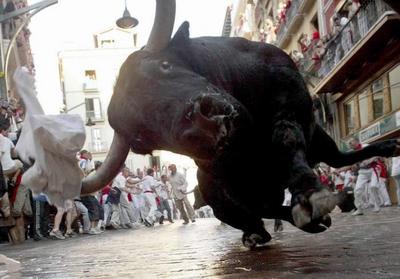Insurgent #8
There was a full moon over Baghdad and Falujah last night. From about fifty feet both cities look very clean and peaceful, with hardly a soul driving because of a 2300-0600 curfew. Only convoys run during the night. The city lights of Baghdad and Falujah show one very large population center, bracketed by the Tigres and Euphrates Rivers.
At night the only difference from the air between Baghdad proper and Camp Victory is...lights. Baghdad is lit up, the US camp is totally dark.

History Lesson:
An insurgency is an armed rebellion by any irregular armed force that rises up against an established authority, government, or administration. Those carrying out an insurgency are “insurgents”. Insurgents conduct sabotage and harassment. Insurgents usually are in opposition to a civil authority or government primarily in the hope of improving their condition.
A reactionary (sometimes: reactionist, or regressive) is someone who seeks to restore conditions to those of a previous era. The political attitude of a reactionary is reactionism or regressivism. Reaction is always presented against something that it opposes.
Reactionary comes from the French word réactionnaire, coined in the early 19th century. It was the first of the two words coined (the other being conservative, from the French word conservateur) for the opposition to the French revolution. In parliamentary usage, the monarchists were commonly referred to as the Right, although they were often called Reactionaries.
A reactionary is sometimes described as an extreme conservative, but whereas a conservative seeks, in the simplest terms, to preserve the status quo, a reactionary seeks to return to the situation of a prior time. In particular the term is used to describe those who are seen to oppose "progress" and particularly revolutionary change, and is used in revolutionary contexts interchangeably with the word counterrevolutionary.
Classical 19th century reactionaries and their heirs idealized either feudalism or the pre-modern era that preceded the Industrial Revolution and the French Revolution when economies were largely agrarian, the landed aristocracy dominated society, a king was on the throne and the church was the moral centre of society. Thus, reactionaries once favoured the aristocracy over the middle class and the working class, even though they later favoured the conservative bourgeoisie. In that context, reactionaries are against democracy and parliamentarism.
Reactionary is nowadays mostly used pejoratively by political groups, especially those of the "left-wing", to qualify politicians that they accuse of wanting to reverse some progress that they claim has been beneficial to society.

















<< Home